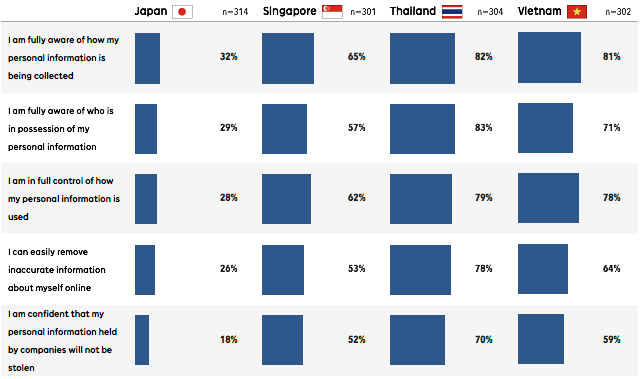Consumer perception of data privacy in Asia
Cyber security and data privacy protection is making headlines around the globe in recent news, especially after the recent worldwide cyber attack by ransomware WannaCry. Companies are scrambling to strengthen security measures, while governments are moving to increase data protection of its citizens (e.g. new data privacy protection laws planned in Japan this month, and EU in 2018).
But what do consumers think about all this? At Rakuten AIP, we asked consumers in Japan, Singapore, Thailand and Vietnam about 1) their opinions of what they perceive as sensitive info, 2) how secure they feel about means of communication, and 3) their perception of how much control they feel they have over their own personal information.
Credit card number top of mind in Asia as most sensitive personal info
Across the surveyed Asian countries, credit card numbers rose to the top as the most sensitive personal information. This isn’t too surprising given that it’s directly tied to your personal finances, and we often hear stories about credit card data breaches.
While government issued ID numbers were also a common piece of sensitive info, countries in Southeast Asia notably picked communication contents as being highly sensitive (e.g. contents of phone conversations, email, chat/text). Japan on the other hand, places home address right behind credit cards, with communication concerns mainly centered around emails.
Q. How sensitive are the following pieces of information to you personally? (Select one for each)
Top 5 summary per country, see Survey Details for full list asked.

Landline viewed as most secure means of communication in Japan, while Mobile & Email on par in Southeast Asia
Among various methods of communication, landline phones are top of mind in Japan for being most secure. In Southeast Asia however, mobile phones & texts, as well as emails are seen as equally secure – Thailand actually places them slightly higher than landlines. Smartphone chat apps and social media, while below phone/text/email, are seen as relatively more secure in Southeast Asia vs Japan.
Q. How secure are each of the following methods of communication? (Select one for each)
4 pt scale Top 2 Box % (Very/Somewhat Secure), data sorted on Japan %

Consumers in Japan less confident over control of personal info vs Southeast Asia
When asked about perceptions of how much control they have over their own personal info, consumers in Japan showed the lowest level of perceived control.
– Less than a third agree that they are fully aware of how their personal info are collected, aware of who’s in possession, and having control over how it’s used.
– Only a quarter feel they can easily remove inaccurate info about themselves online
– Just below a fifth are confident their info held by companies will not be stolen.
Singapore shows a bit more optimism, while consumers in Thailand and Vietnam are much more confident in their control over their own personal info.
Q. How much do you agree or disagree with the following statements about personal information? (Select one for each)
4 pt scale Top 2 Box % (Strongly/Somewhat Agree) data sorted on Japan %

One can clearly see that consumer perception of privacy and security of personal information differs by country and region in Asia – a true portrayal of its diversity. The region has historically been slower than the EU in introducing data protection laws. Many countries have based their laws off of the EU Data Protection Directive of 1995, and introducing their own versions a decade later. As the EU is taking the next step in rolling out a new data protection law in 2018, it could be a turning point for Asia to further strengthen privacy protection for the region.
Japan is on the verge of enacting its new privacy protection law at the end of this month on 5/30, a revision of its current form to be more in line with the upcoming new EU law. Key revisions are centered around ways companies handle personal information, especially around third party disclosures, transfer of data overseas and collection of sensitive info.
It shouldn’t be long before we see activity from other countries in Asia – particularly given how fast the region has adopted new technology catering to all facets of life, which inevitably brings forth increasing issues of privacy protection.
■Survey Details
Markets: Age 18+ in Japan, Singapore, Thailand, Vietnam
Sample Size: ~300 per country
Methodology: Online Survey using Rakuten AIP proprietary panels
Timing: May 8-10, 2017
Table 1 full list asked includes: Credit card number, Home address, Government issued ID number, Email address, Email contents, Website/search history, First and Last Name together, Chat/Text contents, Phone conversation contents, Shopping/purchase history, Social media posts, Birth date, Last Name only, First Name only, Medical history, Relationship status, Location of where you have physically visited, Music, video and other media you like.